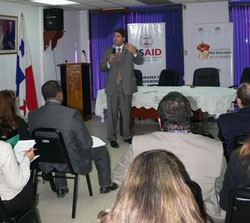
Following an extensive legislative review, the Panamanian government approved a new criminal code designed to modernize the administration of penal justice in Panama and bring it in line with the principles of the rule of law. USAID coordinated a cross sectoral effort aimed at endorsing the adoption of international standards to criminalize corruption as called for by international conventions. This resulted in insertions and/or adjustments to 26 articles of the code’s chapter on crimes against public administration.
USAID faced significant challenges in implementing this task. For example, draft versions of the code excluded important reforms in areas such as illicit enrichment and fictitious government appointments (a recurring crime that entails accepting and/or receiving a salary for a government post without actually doing the job). To overcome these and other shortcomings, USAID assisted in mobilizing support for their inclusion in the final text of the code. This included media appearances, press conferences, public presentations, and the publication of newspaper ads advocating for all pending reforms.
Additionally, USAID specialists advised the anticorruption investigations unit of the attorney general’s office in preparation of arguments to uphold all proposed changes before the National Assembly. Key contents of the code, and most importantly its required scope, were made visible to the public thanks to these actions.
Overall, the new criminal code seeks to establish the foundations of a justice system that resolves social conflicts in a timely, efficient, transparent, impartial, and equitable manner. It aims to install a modern justice system that is capable of conciliating the punitive power of the state while fully respecting and protecting people’s fundamental rights.
“The approval of a new Penal Code, drafted with USAID’s technical support, has been fundamental to expand the scope of the corruption crimes chapter and hence provide new mechanisms to prosecute corruption more effectively,” said Mercedes de León, an anticorruption public prosecutor.







Comment
Make a general inquiry or suggest an improvement.